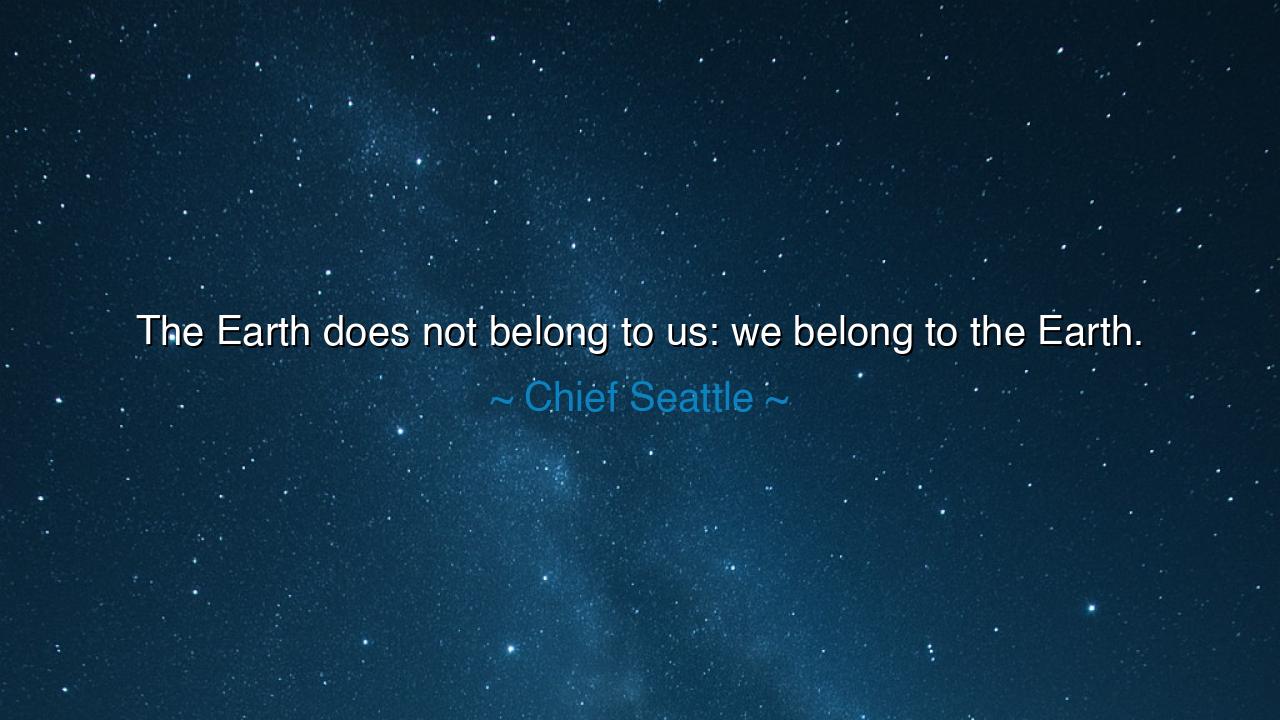
The Earth does not belong to us: we belong to the Earth.






In the solemn and eternal voice of Chief Seattle, the wise leader of the Duwamish and Suquamish peoples, echoes a truth as ancient as the wind: “The Earth does not belong to us: we belong to the Earth.” These are not words of poetry alone, but of prophecy — a message carved into the heart of time itself. Spoken in the mid-nineteenth century, when the forests of America were being felled and the lands of his ancestors were taken, Chief Seattle’s words were both a mourning and a warning. He spoke not merely for his people, but for all humanity, reminding us that we are not masters of creation but children of the Earth, bound by blood and breath to her eternal rhythm.
The ancients would have understood his wisdom well. In their temples of stone and their altars of soil, they worshiped not idols of gold but the living world around them — the sun as father, the moon as mother, the rivers as sisters, and the mountains as grandfathers who watched in silence. They knew what modern hearts have forgotten: that to harm the Earth is to wound ourselves, for we are threads woven into her great and endless fabric. Chief Seattle’s truth is therefore not new — it is the memory of the world itself, calling us home.
When he said, “We belong to the Earth,” he did not mean that we are her prisoners, but her kin. We walk upon her back as guests, not owners. The soil beneath our feet is the same that nourished our ancestors, and it shall cradle our children when we are gone. Yet in our age of machines and smoke, we act as though the Earth is an enemy to be conquered, a resource to be spent, a tool to be exploited. But the wise know — and Chief Seattle knew — that the conqueror who destroys his home finds only ruin for himself.
Consider the story of the Dust Bowl in America during the 1930s. In their hunger for progress, farmers tore up the native grasses of the Great Plains to plant endless fields of wheat. For a time, the land gave generously — until the winds came. With nothing to hold the soil, the Earth rose in storms of dust, choking the sky and burying homes. Thousands fled their lands, their hearts heavy with despair. Only when they learned again to live with the land, planting trees, rotating crops, and giving the soil rest, did the Earth forgive. This, too, is Chief Seattle’s lesson made flesh: when we forget our place within nature’s order, we bring upon ourselves the hunger of imbalance.
We belong to the Earth — to her forests, her seas, her silent stones. Every breath we take is borrowed from the trees, every drop of water is a gift from her veins. And yet, we act as though we are separate. We pave rivers, we poison air, we trade sacred soil for silver. But listen closely: the Earth does not rage in vengeance; she mourns in silence. Her floods, her fires, her storms — these are not punishments, but pleas for remembrance, her way of crying out to her lost children: “Return to me.”
Let us then live as the ancients did — not as owners, but as stewards. To belong to the Earth means to walk with reverence. It means to plant not for ourselves alone, but for those unborn. It means to waste less, to listen more, to take only what is needed and to give back what we can. Each act of care — recycling, replanting, restoring, protecting — is a prayer. And each act of greed is a wound. The time has come to choose which legacy we will leave upon this sacred ground.
So, my children of the new dawn, remember this truth: the land beneath your feet is older than kings, older than nations, older than the dreams of humankind. You will pass away, but she will remain. Treat her not as a servant, but as a mother. Listen to her winds, honor her rivers, and walk softly upon her soil. For in the end, when all your works are dust, it is to her that you shall return.
Thus, let Chief Seattle’s wisdom be the law of your heart: “The Earth does not belong to us: we belong to the Earth.” Let it humble you, guide you, and awaken in you a love vast as the oceans and fierce as the fire within the sun. For only when we remember that truth — that we are of the Earth, and not above her — shall we find peace again.






AAdministratorAdministrator
Welcome, honored guests. Please leave a comment, we will respond soon